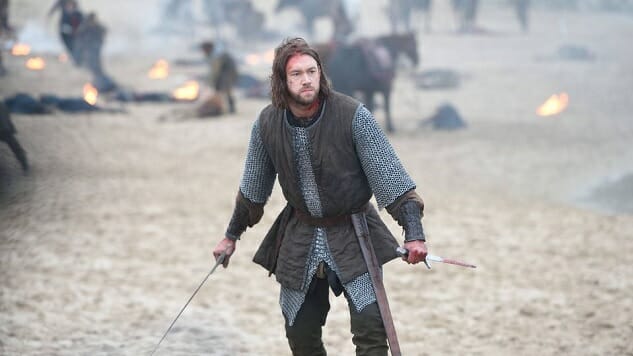
If The Bastard Executioner’s cardinal season can be summed up with a single word, that word is “rushed.” From the show’s premiere to its finale, “Blood and Quiescence/Crau a Chwsg,” every narrative thread, every plot point, every character arc has felt unjustly compressed, like so many square pegs being stuffed into round holes. This, in itself, is a remarkable creative feat: Even though each episode in the series is mostly overlong, Kurt Sutter still failed to give his myriad plot elements proper breathing room and enough time for his audience to develop proper emotional investment; with “Blood and Quiescence/Crau a Chwsg,” that failure is driven home, and brings The Bastard Executioner to an unsatisfying and unearned conclusion.
There are moments here that work. Like last week’s “The Bernadette Maneuver / Cynllwyn Bernadette,” “Blood and Quiescence/Crau a Chwsg” is structured around a single event, with all side plots tying back into that event’s culmination. It’s a battle, or more accurately a skirmish, with Wilkin and Corbett leading a ragtag band of heroes against Archdeacon Robinus, Ed Sheeran, and their significantly better-armed force of Rosula Knights. Watching the two sides go at it proves as viscerally thrilling as any of The Bastard Executioner’s battle scenes, but “Blood and Quiescence/Crau a Chwsg” gets us to the frontlines in as joltingly sloppy a manner as possible. You wouldn’t be wrong to wonder if Sutter left about twenty minutes of material on the cutting room floor just to fit everything into an acceptable forty-five minute framework.
One moment, Corbett, Wilkin, and their men at arms—Locke and Leon, Toran and Berber, Ash and the scribe master—are meeting up with The Wolf and his Welsh rebels. The next, they’re all charging off to cross swords with Robinus’ soldiers. There’s no connective tissue between point A and point B, just a reckless need to push the story along so that people can start chopping heads and stabbing faces. (Sutter, as The Dark Mute, also gets to go out in a literal blaze of glory so batshit insane that it feels like it belongs in a much less medieval drama.) That push occurs even before the good guys team up to fight the bad guys, such as they are; “Blood and Quiescence/Crau a Chwsg” opens with Toran revealing his true identity to Locke, a moment we’ve been anticipating the entire season. Instead of going Thunderdome on one another, though, Locke gets the better of Toran and shows that he’s just about the most honorable guy around. Their scuffle settles their debt, Locke says. “Wait, what the hell?” we reply.
Wilkin and Toran getting revenge on the men they believe killed their families has been the defining through line of the show. It’s why they both wound up in Castle Ventris in the first place, for crying out loud. Yet here they both are, making peace with, respectively, Leon and Locke. Wilkin’s eventual truce with Leon at least makes some sense, because we’re aware of Leon’s innocence, but even their resolution is too easy, nevermind the fact that the person actually responsible for poor Petra’s death gets off scot free. (So to speak; he does turn himself into a human bomb to even the odds against Robinus.) The idea that our Welshman with nothing to lose could end the series by gaining two unlikely friends is, in a word, puzzling.
In two words, it’s frustrating, because their alliance spurns the drama Sutter has theoretically been building on since the start. Worse still, that alliance betrays The Bastard Executioner’s promise as gritty historical fiction while also demonstrating that in the end, it has less chutzpah than Game of Thrones. George R.R. Martin would have killed about half his cast before “Blood and Quiescence/Crau a Chwsg” drew to a close. Sutter can’t help but write a happy ending. Wilkin and Lowry finally hop in the sack. Corbett and Lowry acknowledge their platonic fondness for one another. Isabel might actually get to hop in the sack with Corbett. Leon and Locke get to keep their heads. Luca has a new father figure and no longer has to deal with his cuckoo mother. The Dark Mute is a crispy critter and Jessamy is being sent off to the nuthouse against her will, sure, but in the sandbox The Bastard Executioner plays in, “Blood and Quiescence/Crau a Chwsg” makes for a roundly heartwarming climax.
Would the show have improved with less religious conspiratorial babble? Dan Brown is probably losing his mind at the thought that Wilkin could be a descendant of Christ, but that detail is jammed in at the last possible second and doesn’t add up to anything; Lowry’s false pregnancy is glossed over in a couple lines of dialogue; Wilkin’s parentage has as much impact on his actions as a cloud of vapor; the ruthless murder of a bunch of holy knights at a time of civil unrest doesn’t strike anybody as a potentially major concern. (Also, Ed Sheeran gets to live. If you need evidence that The Bastard Executioner ultimately lacks Game of Thrones’ bite, there’s none better than that.)
The Bastard Executioner’s best merit has been its politicking, which its final episodes sidelined in favor of ass kicking; letting the characters do little but talk showed us more of Sutter’s fictionalized world than all the machismo the series has brought to bear combined. “Blood and Quiescence/Crau a Chwsg” entirely spurns that potential all at once, with just a few hectic scenes of violence and cheap melodrama.
Boston-based critic Andy Crump has been writing online about film since 2009, and has contributed to Paste Magazine since 2013. He also writes for Screen Rant, Movie Mezzanine, and Birth.Movies.Death. You can follow him on Twitter. He is composed of roughly 65% craft beer.